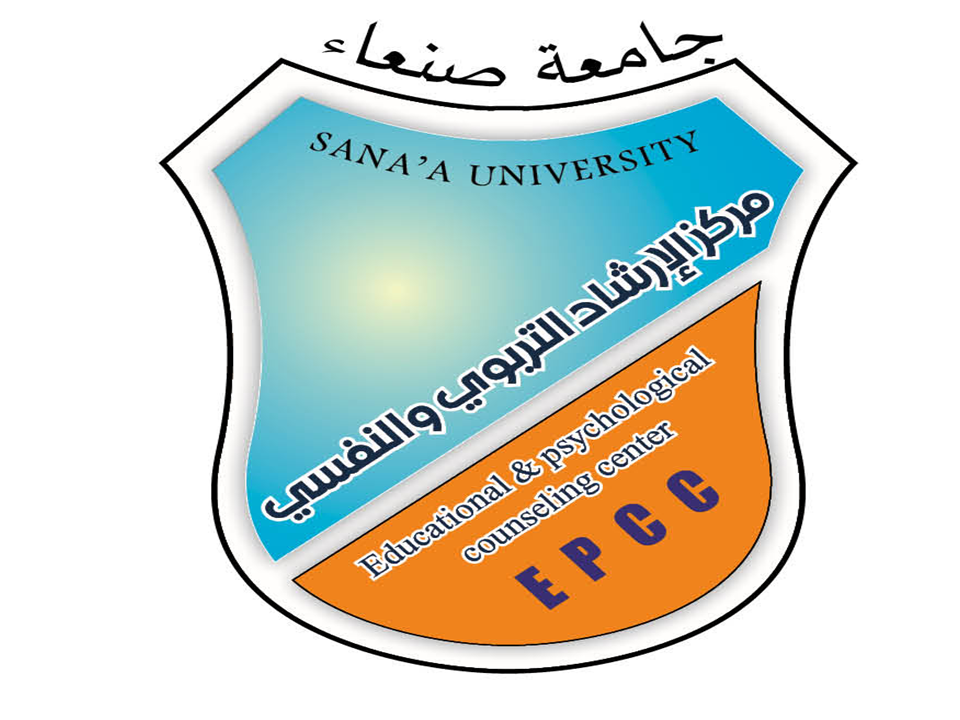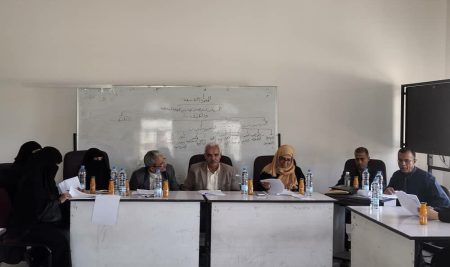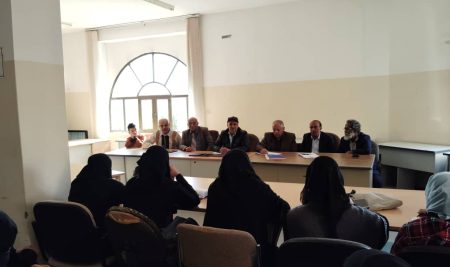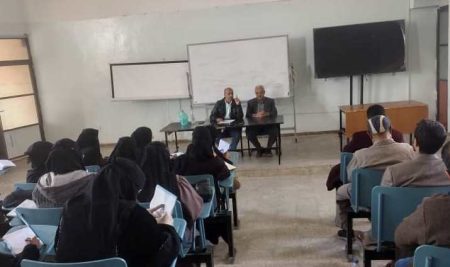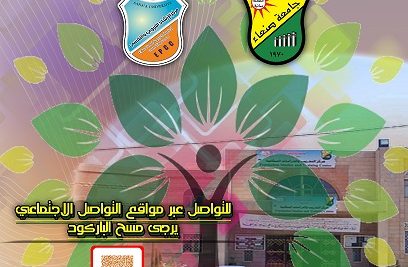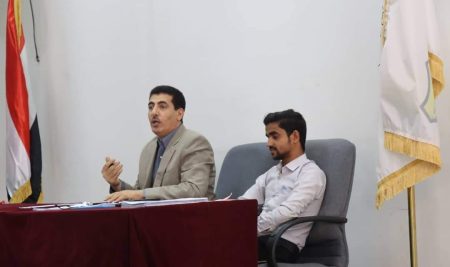Educational and Psychological Counseling Center (EPCC)
Sana'a University
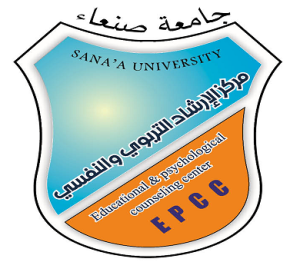
The Center was established pursuant to the University Council’s Approval on 10/6/2002, the University Rector’s Decision No. 251 of 2003, and the University Council’s Approval of the Center’s scientific and research regulations on 27/2/2005.
Pursuant to the Rector’s Decision No. (312) of 1444 AH, two Master’s programs were approved in the following disciplines:
Master’s degree in Crime Psychology and Criminal Justice.
Master’s degree in Organizational Psychology.
The center contributes to community issues related to economics, social affairs, and the environment by organizing lectures and awareness seminars, training psychologists and social workers in schools, as well as conducting courses for staff and faculty members on the importance of psychological counseling and the need for it.
Vision
The center aspires to be a leader in providing educational guidance, rehabilitation and psychological treatment services to the members of Sana’a University, the community, students and all researchers.
Mission
The Educational and Psychological Counseling Center provides distinguished academic, scientific, training and therapeutic services in educational counseling and psychotherapy that are in line with the application of the requirements of the Academic Accreditation Council through excellence in preparing researchers and specialists in the science of educational counseling and therapeutic psychology, in a way that contributes to sustainable development and serves the community and related institutions.
Goals
The center aims to:
Provide educational and psychological counseling services, including rehabilitation and psychological therapy, to members of Sana’a University, the community, researchers, and various organizations and entities. It also aims to conduct scientific, academic, training, and therapeutic courses and programs.
Plan and implement scientific, academic, and training courses and programs in the field of educational and psychological counseling. Provide advice and guidance in educational and psychological counseling to students, organizations, and the community.
Evaluate psychological counseling programs in the areas of therapeutic, educational, vocational, marital, family, child, youth, elderly, and children with special needs counseling. It also provides administrative counseling for employees and leaders.
Develop and assist students in achieving personal, social, and academic psychological adjustment.
Provide psychological, cognitive, and behavioral counseling and treatment for psychological and mental disorders and for socially and morally unacceptable behavior.
Provide psychological, educational, social, and family consultations. It also prepares and implements psychological and counseling programs for students and the community in need, as well as for organizations, the community, university administration, faculty members, and students to address their problems.
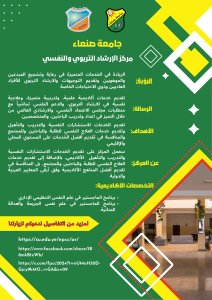
The main scientific units of the center are:
1. The Educational Counseling Unit:
The Educational Counseling Unit is concerned with investigating problems individuals face within educational institutions, including academic underachievement and family problems like marriage, divorce, and childcare that affect individuals’ performance, their academic and professional future, and the community as a whole. Through its professional services, the unit evaluates acute psychological cases, identifies appropriate psychotherapeutic and counseling treatment options, and provides support to individuals to ensure that they have access to the necessary resources to excel academically, be productive, and well-prepared for employment after graduation, and positive contributors to the community.
2. Behavioral Disorders and Psychological Support Unit:
The Behavioral Disorders and Psychological Support Unit is focused on providing psychosocial support to the community for those suffering from societal psychological disorders. It offers guidance and psychological support through specialists, presenting successful and positive solutions to psychological and educational problems. The unit provides treatments for deviations and behavioral disorders for individuals and the community. It also addresses psychological and educational issues resulting from war, violence, societal disasters, abuse, and sexual exploitation.
3. Gifted and Creative Individuals Care Unit:
The Gifted and Creative Individuals Care Unit is concerned with discovering the hidden potential of creative, talented, and innovative individuals, with a priority focus on scientific and applied professional fields. The Unit develops, supports, and nurtures these individuals’ abilities to foster their growth into outstanding, creative citizens and positive contributors to society. It also harnesses their energies as well as encourages them to become active participants in the community. The Unit also contributes to the construction of an academic scientific system, while offering a model for talent, creativity, and innovation at local, regional, and international levels.
4. Community Service Unit:
The Community Service Unit is concerned with developing the capacities of the community and its various institutions by providing innovative and positive solutions to social issues, phenomena, and problems. It offers healthcare treatments through the implementation of quality strategies and programs for awareness and guidance to those in need among individuals and the community. The unit scientifically and educationally develops plans, provides training, executes them, and makes available treatment opportunities and accredited volunteering options for the community.
5. Research, Testing, and Assessment Unit:
The Research, Testing, and Assessment Unit is concerned with developing measurements and tests in scientific research based on contemporary concepts. It supervises tests for all scientific departments, develops research methodologies, constructs and organizes scientific measurements and curricula, and ensures the accuracy of procedures. The unit promotes modern testing culture and explores ways to develop evaluation systems and raise awareness in all aspects of personal and community life (cognitive, emotional, and skill-based). It measures students’ academic achievement levels, identifies strengths and reinforces them, and assesses weaknesses while finding scientific solutions to address them.
6. Research, Testing, and Assessment Unit:
The Research, Testing, and Assessment Unit is concerned with developing measurements and tests in scientific research based on contemporary concepts. It supervises tests for all scientific departments, develops research methodologies, constructs and organizes scientific measurements and curricula, and ensures the accuracy of procedures. The unit promotes modern testing culture and explores ways to develop evaluation systems and raise awareness in all aspects of personal and community life (cognitive, emotional, and skill-based). It measures students’ academic achievement levels, identifies strengths and reinforces them, and assesses weaknesses while finding scientific solutions to address them.
The Educational and Psychological Guidance Center is pleased to invite you to visit the center's website and social media pages by scanning the QR code.

su_34_epcc
May 16, 2025
Educational and Psychological Counseling Center Hosts a Research Seminar for Students
su_34_epcc
January 17, 2025
